|
|
|
Sort Order |
|
|
|
Items / Page
|
|
|
|
|
|
|
| Srl | Item |
| 1 |
ID:
097736
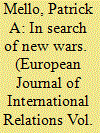

|
|
|
|
|
| Publication |
2010.
|
| Summary/Abstract |
This article examines the literature on 'new wars' as it evolved in Germany, Great Britain and the USA. In order to gain an overview of this heterogeneous field of research five hypotheses are derived concerning characteristics of 'new wars': (1) the erosion of the state's monopoly on the use of force; (2) the political economy of 'new wars'; (3) 'new wars' as asymmetric wars; (4) 'new wars' as identity-based wars; and (5) terrorism within the framework of 'new wars'. The concluding section addresses critiques, provides a brief summary and proposes future research.
|
|
|
|
|
|
|
|
|
|
|
|
|
|
|
|
| 2 |
ID:
166603
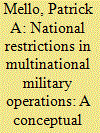

|
|
|
|
|
| Summary/Abstract |
Recent scholarship in security studies has started to explore the causes and consequences of various forms of national restrictions in multinational military operations (MMOs). This article makes a conceptual contribution to this literature by developing a theoretical framework of national restrictions in MMOs that distinguishes between structural, procedural, and operational restrictions. I argue that these types of restrictions are governed by different causal mechanisms. Structural restrictions are relatively stable over time and effect deployment decisions irrespective of other factors. Procedural restrictions, on the other hand, can constitute veto points against deployment only in combination with distinct political preferences. Finally, operational restrictions directly affect the rules of engagement of troop contributing countries. The article illustrates the three types of restrictions and their interaction with empirical examples from a range of countries and sketches their impact on MMO deployment decisions and mandates.
|
|
|
|
|
|
|
|
|
|
|
|
|
|
|
|
| 3 |
ID:
171787
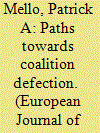

|
|
|
|
|
| Summary/Abstract |
Despite widespread public opposition to the Iraq War, numerous democracies joined the US-led multinational force. However, while some stayed until the end of coalition operations, and several increased their deployments over time, others left unilaterally. How to explain this variation? While some studies suggest that democratic defection from security commitments is primarily motivated by electoral incentives or leadership change, scholars have not reached a consensus on this issue. To account for the complex interplay between causal factors, this article develops an integrative theoretical framework, using fuzzy-set Qualitative Comparative Analysis (QCA) on original data on the Iraq War involvement of 51 leaders from 29 democracies. The findings document the existence of multiple paths towards coalition defection. Among others, the results show that: (1) leadership change led to early withdrawal only when combined with leftist partisanship and the absence of upcoming elections; (2) casualties and coalition commitment played a larger role than previously assumed; and (3) coalition defection often occurred under the same leaders who had made the initial decision to deploy to Iraq, and who did not face elections when they made their withdrawal announcements.
|
|
|
|
|
|
|
|
|
|
|
|
|
|
|
|
| 4 |
ID:
166602
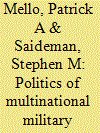

|
|
|
|
|
| Summary/Abstract |
Today, few countries fight alone; most fight as allies or partners in multilateral campaigns. The end of the Cold War opened a window of opportunity for multinational military operations (MMOs). These have seen varying degrees of participation, enthusiasm, and success. This special forum is devoted to the politics of multilateral warfare including their formation, maintenance, and durability. The introduction sketches past research and derives some key questions of continuing relevance. The contributions shed light on the domestic and international politics of MMOs, focusing on the implementation of national restrictions and their repercussions for MMOs, party politics of military intervention, the conditions under which states decide to defect from military operations, and the role of junior partners in MMOs. In sum, this forum offers a fresh look at the politics of MMOs, including conceptual contributions to the study of national restrictions, domestic constraints, and coalition warfare.
|
|
|
|
|
|
|
|
|
|
|
|
|
|
|
|
| 5 |
ID:
189268
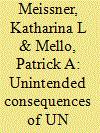

|
|
|
|
|
| Summary/Abstract |
Sanctions are widely used foreign policy tools in reaction to crises in world politics. Accordingly, literature on sanction effectiveness—their intended consequences—is abundant. Yet, fewer studies address the unintended consequences of restrictive measures. This is remarkable given that negative externalities are well documented. Our article explores this phenomenon by asking under which conditions sanctions yield negative externalities. We develop a theoretical conceptualization and explanatory framework for studying the unintended consequences of UN sanctions. Empirically, we draw on data from the rich, but scarcely used Targeted Sanctions Consortium and apply qualitative comparative analysis (QCA) to examine negative externalities of UN sanctions, complemented by illustrations from the cases Haiti and North Korea. The results document the existence of multiple pathways toward unintended consequences, highlighting the negative impact of comprehensive and long-lasting sanctions, as well as the ability of autocratic targets with economic means to persist unscathed from sanctions.
|
|
|
|
|
|
|
|
|
|
|
|
|
|
|
|
|
|
|
|
|